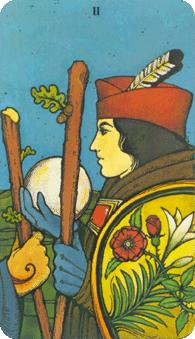2 of Wands: Defying Gravity
(c) Cheryl Lynne Bradley 2006-7

Defying Gravity
I live on a big blue ball
I never do dream I may fall
And even one day if I do
Well I'll jump up and smile back at you
I don't even know where we are
They tell me we're circlin' a star
Well I'll take their word I don't know
But I'm dizzy so it may be so
I'm riding a big blue ball
I never do dream I may fall
And even the high must lay low (even the high must lay low)
But when I do fall I will be glad to go
Yes when I do fall I will be glad to go
By: Jesse Winchester 1975
I have often felt that we live in a world where the rules are set in opposition. The wrong thing becomes the right thing and the right thing is the wrong thing. The good thing is not always the right thing and the right thing is not always the good thing. It becomes easy to hold contradictory thoughts and opinions about the same subject. Sometimes this is merely the perspective from which we are thinking and relates to our involvement in the issue at hand. In some situations we are subjectively involved and in others our stance is objective. Indeed even the world we live in is a harmonization of opposites. We may think in terms of up/down, over/under, inside/outside, north/south, east/west, right/left, in/out, bottom/top. Those are our linear perceptions but we live on a curved sphere and our linear concepts are really just illusory - our senses trying to give us a concept of where we are in time and space. We end up feeling like we are defying gravity.
The Two of Wands in Tarot is an interesting card. A young man stands on a castle wall with a globe in his hand and a staff in the other, another staff stand fixed in place. He seems to be in deep contemplation - wondering. This card is often related to the sadness of Alexander the Great despite the great wealth and power he wielded - he had it all but still something was missing. It is said that Alexander cried because there were no more worlds to conquer. He would really cry if he saw the film version of his life but that is another story. It can viewed as a card of great riches, enchantment and magnificence but on the other hand, great suffering, fear and sadness. Sometimes I think he is trying to decide if he should jump of that wall.
Even our Proverbs, those wonderful pearls of wisdom and insight which are supposed to bring us comfort and insight are set in contradiction. We are told "What will be,will be." but then we are also told , " Life is what you make it." If the pen is mightier than the sword, then how can actions speak louder than words? If you are supposed to look before you leap, how can you be lost if you hesitate?
Many hands are supposed to make a job go faster but too many cooks will spoil the broth. We are supposed to beware of Greeks bearing gifts but we aren't supposed to look a gift horse in the mouth.
There is supposed to be wisdom in silence but then we are told that a man without words is a man without thoughts. Remember that clothes make the man but don't judge a book by its cover. We are better safe than sorry but nothing ventured, nothing gained. Bigger is better but good things come in small packages. Does absence make the heart grow fonder or is it really out of sight and out of mind? If it is the more, the merrier then why is two company and three's a crowd?
“Fickleness and indecision are signs of self-love. If you can never make up your mind what God wills for you, but are always veering from one opinion to another, from one practice to another, from one method to another, it may be an indication that you are trying to get around God’s will and do your own with a quiet conscience. As soon as God gets you in one monastery you want to be in another.As soon as you taste one way of prayer, you want to try another. You are always making resolutions and breaking them by counter-resolutions. You ask your confessor and do not remember the answers. Before you finish one book you begin another, and with every book you read you change the whole plan of your interior life. Soon you will have no interior life at all. Your whole existence will be a patchwork of confused desires and daydreams and velleities in which you do nothing except defeat the work of grace: for all this is an elaborate subconscious device of your nature to resist God, Whose work in your soul demands the sacrifice of all that you desire and delight in, and, indeed, of all that you are. So keep still, and let Him do some work. This is what it means to renounce not only pleasures and possessions, but even your own self.”
From New Seeds of Contemplation by Thomas Merton,
New Directions Publishing Company, New York, NY, 1972. Pages 118-119.
Cognitive dissonance is the feeling of uncomfortable tension which comes from holding two conflicting thoughts in the mind at the same time. This tension will increase depending on how important the issue is to us, the intensity of the conflicted feelings and our ability to rationalize the conflict away. These feelings are strongest when it comes to matters of self-image. Sometimes this conflict is a matter of velleities - the power to choose between contraries and lacking a strong volition or preference either way. Velleities are our soul trying to speak to us without words and trying to cope with the slightest movement of the will - we seem to observe what is present around us, not what is absent.
"Man is timid and apologetic; he is no longer upright; he dares not say 'I think,' 'I am,' but quotes some saint or sage. He is ashamed before the blade of grass or the blowing rose. These roses under my window make no reference to former roses or to better ones; they are for what they are; they exist with God today. There is no time to them. There is simply the rose; it is perfect in every moment of its existence. Before a leaf-bud has burst, its whole life acts; in the full-blown flower there is no more, in the leafless root there is no less. Its nature is satisfied and it satisfies nature in all moments alike. But we postpone or remember. We do not live in the present, but with reverted eye lament the past, or, heedless of the riches that surround us, stand on tiptoe to foresee the future. We cannot be happy or strong until we too live with nature in the present, above time."
Ralph Waldo Emerson
We will eventually have to make a choice and then live the consequences of that choice. At the time we make the choice, we have either changed our attitude or justified our pattern of behaviour by changing what we are conflicted about. The bigger the decision, the bigger the feelings of conflict we could have about it. This applies to people too. We may think a certain way about someone and then they take an action which makes us extremely uncomfortable and we don't know what to do about it. Remember when you start feeling uncomfortable and conflicted, see if you can figure out if the conflict is internal or if it is coming from an external source. If the feeling is internal, see if you can find the root. If someone else is creating the feelings of discomfort, it is your choice whether you continue to let them. It may be a situation in which you are holding onto a secret to protect someone you care about from the consequences of their actions. If someone you know has committed a terrible crime, that knowledge can be an equally terrible burden. If you work for a company that is engaged in dubious practices, it is hard to take the stand and be the whistleblower. The problem is that in holding onto this information, you are in effect condoning the actions of your loved one or your company. If you wouldn't accept the behaviour from a stranger, why would you accept it from someone you know and should be holding to a higher standard? A perfect example of when doing the right thing isn't going to feel good or comfortable. Give it a little time and you will feel the relief and release.
Life does seem to be a very contradictory process. The more you have, the less you are. If you show your poverty, they shame you for being poor. Status is in opposition to significance. Accumulation is opposed to distribution. The only things that seem to be absolute are death and taxes. Are Free Will and Free Won't the same thing? Where does that leave us? We are left with our abilities, those are constant but most can be improved upon. Our motivating forces, both internal and external, will ultimately decide what we do about our situation. It will be our attitude which will decide how well we do it.
“It is useless to try to make peace with ourselves by being pleased with everything we have done. In order to settle down in the quiet of our own being we must learn to be detached from the results of our own activity. We must withdraw ourselves, to some extent, from effects that are beyond our control and be content with the good will and the work that are the quiet expression of our inner life. We must be content to live without watching ourselves live, to work without expecting an immediate reward, to love without an instantaneous satisfaction, and to exist without any special recognition. “
From No Man is an Island by Thomas Merton
(Harcourt Brace Jovanovich, Publishers, New York, 1955) Page 121.

















